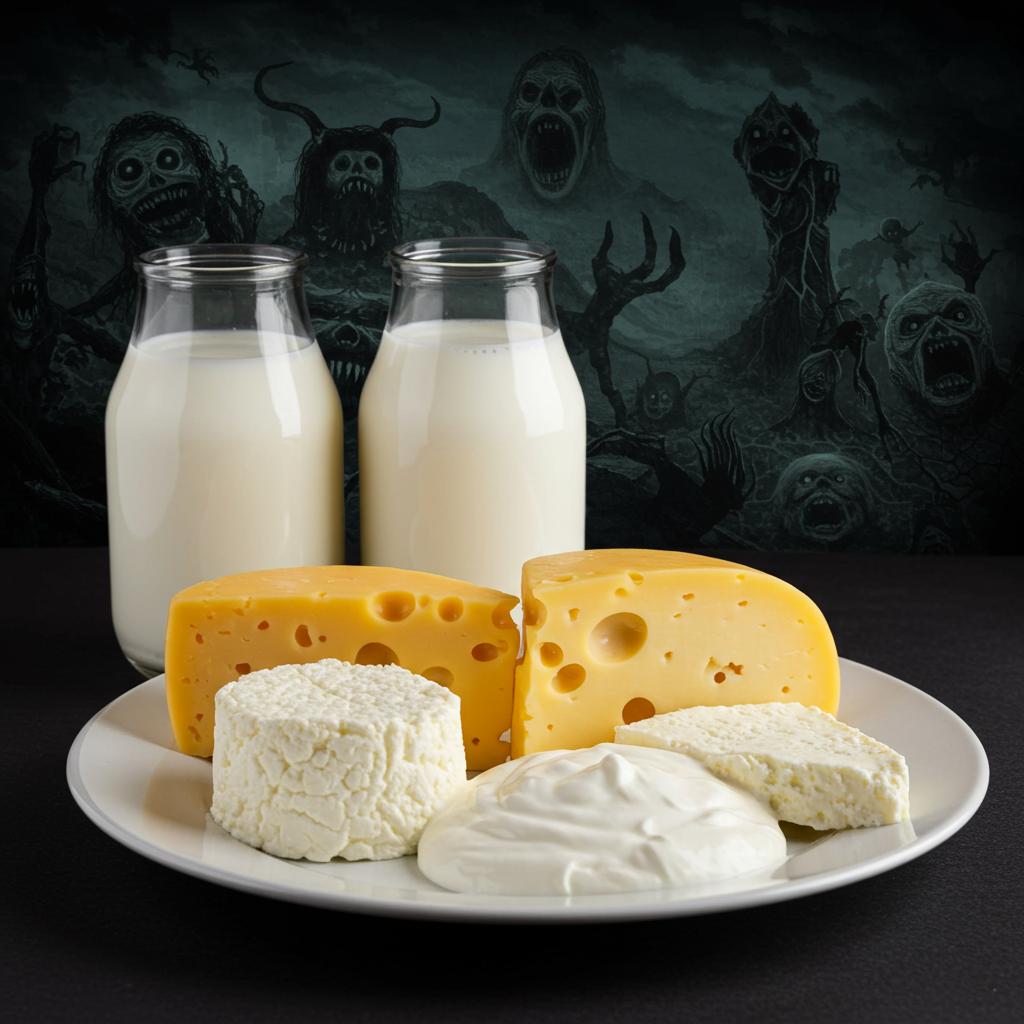For ages, people have joked that a late-night cheese plate could give you bad dreams. But could there be truth to the old wives’ tale? A recent study delved into the complex relationship between what we eat and how we sleep, including the kinds of dreams we experience. The findings offer intriguing insights, particularly pointing towards dairy and digestive comfort as potential players in the world of disturbing dreams.
Published in the journal Frontiers in Psychology, this research suggests a connection between specific eating habits and sleep quality. While the link between food and dreams is still being explored, this study adds new evidence, especially concerning dairy products and their potential impact on nightmares. Let’s explore what the researchers uncovered and what it could mean for your sleep and dreams.
Unpacking the Study: Food Habits and Sleep Quality
The study sought to understand how everyday eating habits might influence sleep patterns and the nature of dreams. Researchers, including Dr. Tore Nielsen from Université de Montréal, surveyed over a thousand college students to gather data on their diet, sleep, and dream experiences.
Data was collected from 1,082 university students over several months. Participants answered online surveys about more than a dozen different food groups. These included common items like meat, fruit, dairy (milk, yogurt, cheese), desserts, and spicy foods. The surveys also questioned participants about their sleep quality, duration, dreams, nightmares, and any perceived links between their diet and their sleep or dreams. Information about food intolerances, general health, and mental health was also gathered.
What Participants Reported
A significant portion of the surveyed students reported a connection between their diet and their sleep. About 40% felt that their eating habits had some effect on how well they slept.
Breaking this down further, approximately one-quarter (25%) of participants specifically blamed certain foods for negatively impacting their sleep quality. The food groups most frequently identified as causing worse sleep were desserts and sweets, spicy foods, and dairy products. On the other hand, around 20% reported that specific foods seemed to improve their sleep. Foods like fruit, herbal teas, and vegetables were commonly mentioned as beneficial for sleep.
When asked directly about the effect of food on their dreams, a smaller group of participants (5.5%) reported noticing an impact. Among this subset, nightmares and disturbing dreams were the most frequently reported effects. Desserts and sweets were cited most often as triggers for these negative dreams (by 31% of this group), followed closely by dairy products (cited by 22%).
The Dairy-Nightmare Connection: A Deeper Look
While the overall percentage of participants linking food directly to dreams was small, the study found a more specific and compelling association when looking at food intolerances. The researchers discovered a surprisingly robust link between self-reported lactose intolerance and experiences of poor sleep quality, increased nightmares, and gastrointestinal symptoms.
This suggests the connection might not just be about eating dairy, but about how well your body can digest it. For individuals with difficulty processing lactose, dairy consumption could lead to uncomfortable physical symptoms overnight.
The Proposed Mechanism: GI Distress
The study authors propose a clear mechanism explaining the link between dairy, lactose intolerance, and disturbing dreams. According to their analysis, consuming dairy before sleep, especially for someone with lactose intolerance, can trigger gastrointestinal distress.
Symptoms like bloating, cramping, excessive gas, or stomach pain can arise during the night. This physical discomfort is believed to disrupt sleep architecture and quality. When sleep is disturbed, particularly during REM sleep (the phase where most vivid dreaming occurs), it can potentially influence the content or intensity of dreams, making them more likely to be disturbing or recalled as nightmares. As Dr. Nielsen noted, sleep disruption caused by severe gastrointestinal symptoms appears to make nightmares worse for lactose intolerant individuals. This aligns with the understanding that various bodily sensations can impact what we dream about.
Expert Perspectives and Study Limitations
While the study provides intriguing data supporting the dairy-nightmare link, particularly through the lens of lactose intolerance, it’s important to consider expert perspectives and inherent limitations of the research design.
Questioning the Link: Recall vs. Content
Dr. Marie-Pierre St-Onge, a nutritional science professor not involved in this study, offered valuable insights. She acknowledges the concept of “prodromal” dreams, where bodily changes or sensations can influence dream content. However, she also raised points about the study’s methodology and interpretation.
Dr. St-Onge highlighted that the percentage of participants explicitly connecting food to dreams (5.5%) was relatively small. More significantly, she suggested an alternative explanation for the observed link between GI distress and nightmares. Pain or discomfort from digestive issues could simply cause individuals to wake up more frequently during the night. If these awakenings occur during REM sleep, the person is more likely to remember whatever dream they were having at the time. This could include nightmares that might otherwise have been forgotten upon waking naturally. In this view, the GI issue doesn’t necessarily cause the nightmare content itself but rather leads to better recall of a potentially disturbing dream. Dr. St-Onge also mentioned she isn’t aware of other research proving specific foods directly influence the content of dreams.
Study Design Considerations
The study authors themselves acknowledged potential biases in their research. The participants were university students enrolled in psychology courses. This background might have exposed them to topics related to sleep, dreams, and psychological interpretation, potentially influencing how they reported or interpreted their own experiences. Dr. St-Onge echoed this concern, noting that participants receiving course credit might feel a “willingness to please the investigator,” potentially biasing responses.
While the findings on lactose intolerance and nightmares were described as robust within the study data, the authors and other experts agree that more research is needed to confirm these associations definitively and explore the causal pathways.
What Can You Do? Practical Advice
So, what does this mean for you if you enjoy dairy or suffer from frequent disturbing dreams? The study and expert commentary offer practical guidance.
Addressing Suspected Dietary Triggers
If you experience frequent nightmares and suspect a link to your diet, particularly dairy consumption, experimenting with eliminating the suspected food culprit is a reasonable first step, according to Dr. St-Onge. This is especially true if you have diagnosed lactose intolerance or suspect you might.
The Importance of Overall Diet and Managing GI Issues
Both the study findings and expert opinion underscore the importance of managing any gastrointestinal distress for better sleep quality. If you are lactose intolerant, avoiding or limiting dairy to amounts your body can handle is crucial, as any resulting discomfort will negatively impact your sleep.
For individuals without lactose intolerance, completely cutting out dairy might not be necessary or beneficial, as it is a source of important nutrients. Instead, focusing on the overall quality of your diet is recommended. Dr. St-Onge’s own research suggests that consuming more fruits, vegetables, and complex carbohydrates can lead to less interrupted sleep. Prioritizing whole foods and a balanced diet is a general strategy for improving sleep health.
The Road Ahead: Need for Further Research
This study provides compelling evidence for an association between dairy, lactose intolerance, and nightmares, likely mediated by sleep disruption caused by digestive discomfort. However, the researchers and external experts emphasize that this is not the final word on the subject.
More diverse populations need to be studied to see if these findings generalize beyond college students. Crucially, experimental studies are needed. These would involve controlled trials where participants consume specific foods, like cheese, before sleep, allowing researchers to monitor effects on sleep patterns and dream content more directly compared to a control group. The relationship between overall diet quality and sleep is also complex, with potential bidirectional links that require further investigation.
Frequently Asked Questions
What did the study find about dairy and dreams?
A recent study in Frontiers in Psychology found that a small percentage of participants (5.5%) believed food affected their dreams, blaming sweets and dairy for nightmares. More significantly, the study found a strong association between lactose intolerance and increased nightmares, poor sleep, and GI symptoms. Researchers propose that digestive discomfort from dairy in lactose-intolerant individuals may disrupt sleep and influence dreams.
Does this mean everyone should stop eating dairy to avoid nightmares?
Not necessarily. The study highlighted a link primarily in individuals with lactose intolerance. For those sensitive to dairy, limiting or avoiding it can help improve sleep by preventing digestive discomfort. For people without lactose intolerance, cutting out dairy might not be beneficial, and focusing on overall healthy eating (fruits, vegetables, whole grains) is more important for general sleep quality. Always consult a healthcare professional for personalized dietary advice.
Why might digestive issues cause bad dreams?
The leading theory from the study is that gastrointestinal distress, such as bloating, gas, or pain caused by lactose intolerance, can disrupt sleep. This physical discomfort makes it harder to sleep soundly and may cause awakenings, particularly during REM sleep when vivid dreams occur. Waking up during a dream increases the likelihood of recalling it, and if the dream was disturbing, it’s remembered as a nightmare. The discomfort itself might also influence the dream content.
In conclusion, while the idea that dairy causes nightmares has been around for generations, this study offers scientific backing, suggesting the link is likely tied to lactose intolerance and the resulting digestive distress that disrupts sleep. It highlights the intricate connection between our gut health, sleep quality, and the mysterious world of dreams. While more research is needed, managing digestive discomfort, particularly for those with sensitivities, appears to be a valuable strategy for potentially improving both sleep and dream experiences.
Word Count Check: 1120 words


